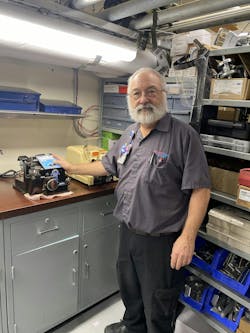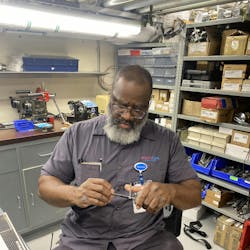When I was approached to speak with someone about locksmithing in the healthcare world, I immediately thought of the two gentlemen featured here: David Belber and Byron Clark both work as locksmiths for AtlantiCare Medical Center in Atlantic City, New Jersey. Here is our conversation.
Locksmith Ledger: Dave, let’s begin with a little history and how you wound up working in a hospital environment. When did the locksmithing journey begin for you?
David Belber: The summer of 1972. I worked for a company called Smith Bros. in Atlantic City. When Mr. Smith came back from World War II, he opened up a lock shop and model shop. I learned a lot there. I was always very interested in locks. My dad introduced me to a guy named Danny who was a locksmith and he taught me the ropes early on. I was offered an apprentice position and learned the hard way.
LL: So, you started off working for what I call a “retail locksmith,” serving the public. Did you do residential as well as commercial work?
DB: We did lots of everything. Lots of work for several banks in the area. We also cut lots of keys in the shop and after a time I knew my key blanks.
LL: I know you worked at Stockton University. What else did you do before working here at the hospital?
DB: I left Joe in 1980 and went to work for Bally’s Park Place. I was there for a short time until I received an offer to work for the original Golden Nugget. I stayed there until 2010. My wife passed and I retired for a couple of years to take care of my kids. I eventually decided to come back to work and landed at Stockton University. I was there for about eight years when I left and came over here to AtlantiCare.
LL: Did you find yourself needing a change, is that why you left?
DB: There was a lot going on there; it got so busy that education wasn’t a priority, and we weren’t learning what we needed to know to do our job properly. I realized it was time to get my education elsewhere and came to AtlantiCare. I brought this gentleman with me. (Byron Clark enters the room). That was almost four years ago.
LL: As we know, the actual hardware doesn’t change from place to place so what’s different about working for a healthcare facility? When you wake up, do you have a good idea of what’s in store for your workday?
DB: No, not even close since the hospital doesn’t close and who knows what may have happened in the course of the evening. We could’ve had a door destroyed by a gurney with an upset patient. Something like that will change the program.
LL: So, you could be in the middle of rekeying 100 cores and then these things take priority?
BC: We wouldn’t be doing that here. A project like that would be outsourced under our supervision since there’s only two of us. If we had three or four guys, we could afford to dedicate a couple to a project like that.
LL: Byron, where did your knowledge of locksmithing begin?
Byron Clark: I started at the Taj Mahal, then to the Showboat and I learned that casino life was not for me when it closed. I looked at where the growth was, and I wound up at Stockton University. That’s where Dave and I met; I learned a lot working with him.
LL: What’s unique about the healthcare environment as far as your workday?
BC: Priorities and working conditions are different. In a lot of areas, you have to mask up and wear special protective equipment. We have to learn about Incra Barriers. This is done where the patient has a contagious condition and a plastic barrier that gets zipped up is used. Just going into a certain room requires this kind of precaution so that’s pretty different.
LL: What’s the big difference between here and the casinos?
BC: At the casino I worked on the locks, which was the locksmiths’ job, while the hinges might be someone else’s. Not in all casinos but where I was, I couldn’t work on the hinges or the electrical part of a lock. When I got to the college, I could work on anything without those kinds of limits.
LL: I imagine while being the locksmith at a casino, you’re dealing with the same hardware over and over. That must have changed when you went to Stockton University.
BC: Hardware is hardware, but the difference has to do with the quality. A Von Duprin panic bar has many parts to it that you can service. A cheaper brand has less parts that are serviceable, so you wind up replacing the whole thing when something’s wrong. At my first locksmith job at the Taj Mahal, we didn’t work on hinges, etc. but we did take apart mortise locks to repair, so I got some good experience there. When you do get schooling, it’s usually about how to install hardware, not repair it. It’s different because to repair it you have to know how it works in the first place.
LL: How does your day begin here? Do you know what to expect when you get to work?
BC: You’ve got work orders that are pending, and they don’t always get done right away. The next day I’ll know which work orders are left but I have no idea what may have happened overnight. When they are locked out of their lockers, we open them. Unfortunately, they don’t always ask us about new hardware like locker locks, for example. They can be gotten with or without an override key and although it might be cheaper without it, it costs more in the long run. If a surgeon can’t get into his locker, it becomes urgent. We have a mix of systems like Best, Schlage, etc. If they asked us, it would be more of the same so we could have it all under the same key system.
LL: We’ve met at South Jersey Locksmith Association meetings before, and I remember speaking with your son who came with you. Would you recommend working in this kind of environment as a locksmith in the future?
BC: I do think it’s a good place to work but I’d like to see him work on the outside first. You learn more about everything. You’re more limited here because you’ll only learn about and work on what’s here. I was exposed to much more when I worked at the college and got to do more.
DB: When we were at the college, we had Corbin, Russwin, Yale, Best, Schlage, Von Duprin, Sargent, etc. We had the old pot belly closers. I broke my teeth learning how to take them apart and scrub and rebuild them.
LL: Do you both agree that the variety of lock hardware you’re exposed to is more at previous jobs than here at the hospital?
DB: Yes. Just yesterday a locksmith who works at another location and who’s a very good mechanic called me because he was working on a Schlage mortise lock, institutional function. Somebody messed with it and finally dropped it in his lap to put it back together. I went over and we spent a couple of hours getting it back together.
BC: I had one that I had just put back together. The guy I worked with asked if I thought I understood how it went back together. After I said yes, he dumped it on the table for me to do again! I was able to open and look at another one so that made it much easier.
LL: How did working here during Covid affect things?
DB: Everything you touched, you had to clean before you worked on it. You had no idea of the health status of people around you. The first thing we did with hardware before working on it was to dump it in alcohol and clean it. You’d do what you had to and then go put it back on while wearing gloves and a mask.
You can’t ignore it. If you’re in good health and take care of yourself, you’ll probably be okay. Proper protection, cleaning stuff off was always important. What am I bringing into the room that could affect the others? There is that concern. Just getting around was somewhat challenging. You had ICU and critical care units. When a door broke, you didn’t have the luxury of being able to move the patient out. They were hooked up to monitors, oxygen and lord knows what else and we had to make it so the door worked properly. The challenge was to be creative enough to get it taken care of and safe for now until the room wasn’t occupied.
LL: It sounds like a very responsible position to be in. Does that make a difference to you?
DB: I’m not sure about the locksmith trade in general but if I fix a door, it’s very important to me that it works properly and everyone that needs to, can get in and out. I don’t want to hear that someone’s locked in or out. Byron and I both take that very seriously and lots of pride goes into the work we do here.
LL: Can you think of any types of hardware or particular functions being used here that you wouldn’t see otherwise?
DB: Basically, we use storeroom, classroom and privacy functions as well as panic hardware. The hardware doesn’t change all that much whether you’re in a hospital, school or commercial building. It’s more about how it’s used and abused and how good the quality of hardware it is. You can use the cheap stuff or spend money on the good stuff, so it lasts a while.
I’ve repaired hardware here that’s 20 years old and there’s nothing wrong with it besides a bad spring or a screw fell out or whatever. I’ve been rebuilding the chassis on locks that I’m told can’t be repaired. It’s easier with good quality hardware. It’s amazing what you can do when you have to get something to work, and you don’t have a replacement on hand.
LL: Is there hardware you have to use or can’t use in some places here?
DB: We use lots of Alarm Lock Trilogy locks here but in some areas we can’t. We have some closets in an area where lots of water is used. Needless to say, anything electronic tends to not do well when it’s exposed to water so we use the Kaba 1000 series locks for those doors. They’re less expensive and will keep going whether it’s wet or dry. Cleanliness is extremely important here and there are times when keeping an area clean requires the use of water and that can’t be helped.
LL: Dave, would you recommend working in a healthcare environment as a locksmith?
DB: I would tell anyone to work on the outside first. Learn everything you can, the different types of lock hardware and the options available. Once you’re inside a place like this, it’s more of a regimented situation, not too many changes. Healthcare is a great place to learn because it’s a unique environment. It’s not always easy because you have to think outside the box. You need to consider the patient, not the customer. It’s more about how to make it right and how to make it so everybody is safe.
LL: What do you see the future bringing us in this environment? What will be different in 20-30 years?
DB: In spite of all the electronics, a locksmith is still going to be needed to make it work. We have a brand-new restricted care area where new doors and electronic locks have been brought in and they don’t work. The hardware on the doors isn’t compatible with the electric strikes being used. The contractor doing the work just couldn’t understand why and didn’t want to listen to my explanation of why it wasn’t working. I explained that as long as he insisted on doing things his way, then it’s his phone that will be ringing when things go wrong. We can’t have a nurse locked in or out of an area, not an option. Contractors were hired to install hardware without any working knowledge of how it will work. I was taught how and why something works is what’s important.
There’s lots of new hardware and ideas coming along that sound great but before it’s used in a hospital or school setting, it better be thoroughly tested in a real-life situation, not somebody’s laboratory. Here it could mean a life. We don’t have time to play around. It’s got to be right the first time it’s being used here. Fortunately, my supervisors are people who will listen to us about what’s needed and that helps us to get things done correctly. It also helps to have a coworker like Byron to bounce things off of.
LL: Based on our conversation and what I’ve learned about you and Byron, I have to say that this hospital is very lucky to have you both.
About the Author
Steve Kaufman
Steve Kaufman has worked for distributors in the locksmith industry since 1993 and worked as a full-time locksmith from 1978 through the 1980s. Kaufman is the sales manager for IDN Hardware out of its Philadelphia location.


